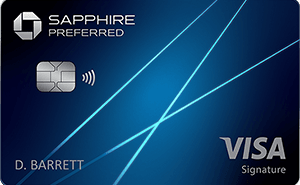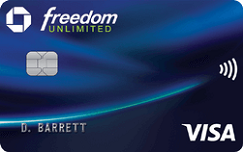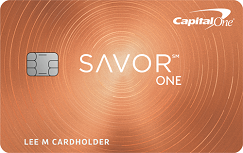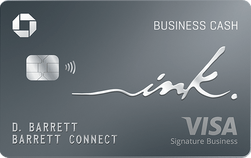Rewards are a credit card issuer’s way of saying “we want your business!” But with so many rewards options on the market, how do you determine which one is right for you?
It all comes down to finding what fits with your everyday spending habits and goals.
To help you narrow it down, we’ve rounded up our favorite rewards credit cards by category. From travel rewards, to cash back on dining and gas, to strong sign-up bonuses, one of these top rewards credit cards should suit your shopping (and redemption) habits.
Best rewards credit cards
- Best for cash back rewards: Discover it® Cash Back
- Best for dining rewards: American Express Gold Card
- Best for gas rewards: Costco Anywhere Visa Card by Citi
- Best for travel rewards: Chase Sapphire Preferred® Card
- Best for premium travel rewards: The Platinum Card from American Express
- Best for rewards on everyday purchases: Chase Freedom Unlimited®
- Best rewards card for students: Capital One SavorOne Student Cash Rewards Credit Card
- Best rewards card for small businesses: Ink Business Cash® Credit Card
- Best rewards card for balance transfers: Citi Custom Cash℠ Card
- Best rewards card sign-up bonus: Marriott Bonvoy Brilliant American Express Card
Discover it® Cash Back: Best for cash back rewards
Pros:
- Up to 5% back on rotating bonus categories
- Discover will match your first year’s cash back earnings
- No annual fee
Cons:
- No traditional welcome bonus
- Only 1% back outside of bonus categories
The Discover it® Cash Back has an excellent return rate for your spending of up to 5% in its bonus categories. The catch? Those categories change each quarter, so you’ll need to keep on top of when and how you can earn.
You’ll earn 5% cash back on up to $1,500 in spending each quarter (then 1%). On all other purchases, you’ll earn 1%.
While earning the 5% requires some work on your part (you’ll need to activate each quarter), with past bonus categories like Amazon, gas stations, and grocery stores, that 5% back isn’t hard to achieve.
However, the Discover it® Cash Back also has a superpower no other card has: Discover will match all the cash back you earn during your first 12 months of card membership. That means those 5% categories become 10%, and all other purchases become 2%.
In other words, you could quite effortlessly earn $600 in bonus cash during the first year you have the card, which is pretty amazing.
American Express® Gold Card: Best for dining rewards
Pros:
- Earns Amex Membership Rewards® points
- Up to 4 points per dollar for everyday spending
- Potentially hundreds of dollars in free food annually
Cons:
- $250 annual fee
The American Express® Gold Card is the single best card for foodies. There are a few reasons for this.
First, it comes with two statement credits which can be used for free food:
- Up to $120 per year in dining credits (doled out in $10 monthly increments), valid for Grubhub, Seamless, The Cheesecake Factory, and participating Shake Shack locations. You’ll have to enroll your card to get this benefit.
- Up to $120 in Uber Cash each year (again, doled out in $10 monthly increments). You can use Uber Cash for free food via Uber Eats.
If you use these credits each month, you’ve effectively reduced this card’s $250 annual fee to just $10 per year.
You’ll also earn 4 Amex Membership Rewards® points per dollar at both U.S. supermarkets (on up to $25,000 in spending per year, then 1x) and at restaurants worldwide. So whether you’re dining out or buying ingredients for your own creations, you’ll get a healthy amount of points for your spending.
The Amex Gold Card currently offers a welcome bonus of 90,000 points after spending $4,000 on eligible purchases within the first six months from account opening.
Amex Membership Rewards® points are best redeemed for travel. You can transfer them to airline and hotel loyalty programs for massive value. I recently transferred Amex points to Hilton for an upcoming stay at the Waldorf Astoria Maldives (a resort which routinely costs $2,500+ per night), where I got a value of 2.1 cents per point.
However, if your main goal is cash back, this is not the card for you. You’ll only get 0.6 cents per point when redeeming for cash.
Read more: Best credit cards for restaurants and dining
Costco Anywhere Visa® Card by Citi: Best for gas rewards
Pros:
- High return at gas stations and EV charging worldwide
- No annual fee with your paid Costco membership
Cons:
- Gas station bonus category is capped
- No public welcome bonus
The Costco Anywhere Visa® Card by Citi is a good card to have even if you never shop at Costco. You’ll receive:
- 4% back at gas stations and EV charging stations worldwide (on up to $7,000 in spending per year, then 1%)
- 3% back on restaurant and eligible travel purchases worldwide
- 2% back on all other purchases at Costco warehouses and via Costco.com
- 1% cash back for everything else
To clarify, that 4% return at gas stations is not just at Costco gas stations — it’s any gas station. Though it’s worth noting that you must fill up at a proper gas station. Superstores, convenience stores, supermarkets, or warehouse clubs that aren’t Costco will earn just 1%.
This card doesn’t have a welcome bonus eligible to the public. But some members have had luck applying in-warehouse and asking if they are eligible for a special offer. It’s worth a try!
Read more: Best gas credit cards
Card info has been collected by MoneyUnder30 to help consumers better compare cards. The financial institution did not provide or approve card details.Chase Sapphire Preferred® Card: Best for travel rewards
Pros:
- Generous welcome bonus
- Earns Chase Ultimate Rewards® points
- Solid travel insurance
Cons:
- $95 annual fee
The Chase Sapphire Preferred® Card is widely considered to be the best starter rewards credit card. It earns bonus points in everyday categories — and the rewards it earns are super easy to use. You can redeem your points for things like:
- Cash back, gift cards, and merchandise (1 cent per point)
- Travel through the Chase Travel Portal (1.25 cents per point)
- Flights and hotel stays by transferring rewards to travel partners (potentially 2+ cents per point)
The Chase Sapphire Preferred® Card currently comes with a welcome bonus of 80,000 bonus points after you spend $4,000 on purchases in the first 3 months from account opening. That's $1,000 when you redeem through Chase Ultimate Rewards®.
This card also has excellent travel insurance for a $95 annual fee card. I’ve had this card for over six years, and it’s saved me thousands of dollars since then on scratched rental cars, canceled flights, and delayed luggage. It’s served me so well that I figure I’ll never cancel it.
The Chase Sapphire Preferred is a travel-focused card. If you average less than one trip per year, this isn’t the card for you.
See card details/apply or read our full review of the Chase Sapphire Preferred® Card.
The Platinum Card® from American Express: Best for premium travel rewards
Pros:
- Large welcome bonus
- Over $1,000 in practical statement credits each year
- Offers free membership to valuable travel programs
Cons:
- $695 annual fee
- Many annual statement credits are very niche
The Platinum Card® from American Express is almost comically jam-packed with statement credits and other various ongoing perks. Sometimes it feels like you need a master’s degree to properly maximize its yearly benefits. But if you take the time to learn, you can easily offset the card’s $695 annual fee by two (or even THREE) times.
Here’s a quick rundown of the card’s most valuable statement credits:
- Up to $200 in Uber Cash each year (doled out in monthly increments)
- Up to $200 in airline fee credits each calendar year
- Up to $200 in hotel credits each calendar year when booking prepaid stays through Amex Travel
- Up to $240 in annual credits toward eligible digital subscriptions (such as Peacock, Audible, Disney+, etc.)
- $12.95 in monthly credits to offset the price of a Walmart+ membership
- Up to $189 in annual statement credits toward CLEAR membership (which helps you skip to the front of airport security lines)
And that’s just the beginning. The Amex Platinum also gives you elite status with Hilton, Marriott, and Hertz; it gives you the most comprehensive airport lounge access of any card; and it gives you access to Amex Fine Hotels & Resorts — a booking platform that gives confers free breakfast, property credits, room upgrades (when available), and more when you book fancy hotels.
Oh, and the card also comes with 150,000 bonus Amex Membership Rewards® points after you spend $6,000 on purchases within the first six months from account opening. Again, these points are extremely valuable for booking travel. This bonus can easily be worth $1,500+ when you transfer your points to Amex’s valuable airline and hotel partners.
Read more: Are Amex cards worth it?
Chase Freedom Unlimited®: Best for rewards on everyday purchases
Pros:
- At least 1.5% back on every purchase
- Cash back can be converted into airline miles and hotel points (if you have the right cards)
- No annual fee
Cons:
- Forgettable ongoing benefits
- Charges foreign transaction fees
The Chase Freedom Unlimited® is an excellent go-to card when your spending doesn’t fall into a bonus category with one of your other cards. Things like medical bills, car insurance, and utilities should go on this card — as most other cards will otherwise earn you 1% back (or 1 point per dollar) at best.
This card earns the following:
- 5% back on travel purchased through the Chase Travel Portal
- 3% back on dining and at drugstores
- 1.5% back on all other purchases
The Chase Freedom Unlimited® is also currently offering a welcome bonus of an additional 1.5% on all purchases (up to $20,000 spent in the first year). So, 5% on travel becomes 6.5%, 3% on dining and drugstores becomes 4.5%, and 1.5% on all other purchases becomes 3%.
Note that rather than straight cash back, this card technically earns Chase Ultimate Rewards® points. And if you’ve got the Chase Sapphire Preferred®, Chase Sapphire Reserve®, or the Ink Business Preferred®, you can convert the rewards you earn with this card into airline miles and hotel points for potentially way more than just 1 cent per point — which is what you’ll get if you redeem for cash.
See card details/apply or read our full review of the Chase Freedom Unlimited®.
Capital One SavorOne Student Cash Rewards Credit Card: Best rewards card for students
Pros:
- 3% back in popular spending categories
- Cash back can be redeemed for any amount and rewards never expire
- No annual fee
Cons:
- Meager welcome bonus
- Offers no intro APR on purchases or balance transfers
The main draw of a student credit card is the fact that you can open it with limited (and sometimes ZERO) credit history. Earning rewards are not exactly the specialty of this credit card genre.
But the Capital One SavorOne Student Cash Rewards Credit Card apparently didn’t get the memo, because check out these excellent return rates:
- Earn 8% cash back on Capital One Entertainment purchases
- Earn 5% cash back on hotels and rental cars reserved via Capital One Travel
- Earn 3% cash back on dining, entertainment, popular streaming services, and at grocery stores (excluding Walmart and Target)
- 1% cash back on all other eligible purchases
This is more impressive than most non-student cash back credit cards! Plus, this card offers a $50 bonus when you spend $100 on purchases within 3 months from account opening.
If you plan to apply, be prepared to prove that you are either enrolled or admitted and planning to enroll in the next three months at an accredited university, community college, or other higher education institution.
See card details/apply or read our full review of the Capital One SavorOne Student Cash Rewards Credit Card.
Ink Business Cash® Credit Card: Best rewards card for small businesses
Pros:
- Huge limited-time welcome bonus
- No annual fee
- Up to 5% back on common business purchases
Cons:
- You must have your own business to qualify
- Low earning rate for non-business purchases
- Bonus categories have an annual cap
The Ink Business Cash® Credit Card is another card marketed toward small businesses but is valuable for just about everyone. It comes with things like primary rental car insurance (when renting for business purposes) and 0% intro APR on purchases for the first 12 months (then 17.99% - 23.99% Variable). For spending, you’ll earn:
- 5% back at office supply stores and for internet, cable, and phone services (on up to $25,000 in spending per year, then 1%)
- 2% back at gas stations and restaurants (on up to $25,000 in spending per year, then 1%)
- 1% back on all other purchases
Even better, the card technically earns Chase Ultimate Rewards® points, which can be redeemed for 1 cent each. So you’re really earning between 1 and 5 points per dollar. If you’ve got a card like the Chase Sapphire Preferred®, Chase Sapphire Reserve® Card, or the Ink Business Preferred® Credit Card, you can convert the rewards you earn with the Ink Business Cash® Credit Card into valuable airline miles or hotel points for potentially outsized value.
This card currently offers a highest-ever bonus of $750 bonus cash back after you spend $6,000 on purchases in the first 3 months after account opening. That’s straight up nuts for a card that charges no annual fee.
See card details/apply or read our full review of the Ink Business Cash® Credit Card.
Citi Custom Cash℠ Card: Best rewards card for balance transfers
Pros:
- Up to 5% cash back in everyday categories
- Your most utilized (qualifying) category will automatically be bonused
- No annual fee
Cons:
- Bonus cash has a (quite low) monthly cap
- Only one category per month will earn 5% bonus cash
A card that offers 0% intro APR on balance transfers can be a great way to mitigate any fiendishly high interest you may be paying on another one of your credit cards. Simply transfer your balance to one of these cards, and you’ll have an interest-free window to pay down your debt without being penalized.
The no-annual-fee Citi Custom Cash℠ Card offers 0% intro APR on both purchases and balance transfers for 15 months (then 18.99% - 28.99% (Variable)). That’s a long time — and though you can find other cards with longer 0% periods, they are likely less rewarding than the Citi Custom Cash℠ Card.
It earns 5% back on up to $500 in spending each month for your most used bonus category. Eligible categories are:
- Grocery stores
- Restaurants
- Gas stations
- Select streaming services
- Drugstores
- Home improvement stores
- Select travel
- Select transit
- Fitness clubs
- Live entertainment
This card charges a 5% fee for balance transfers, with a $5 minimum fee.
See card details/apply or read our full Citi Custom Cash℠ Card review.
Card info has been collected by MoneyUnder30 to help consumers better compare cards. The financial institution did not provide or approve card details.Marriott Bonvoy Brilliant® American Express® Card: Best rewards card sign-up bonus
Pros:
- Welcome bonus worth potentially $1,000+
- Excellent travel-related benefits
- Hundreds of dollars in annual statement credits
Cons:
- $650 annual fee
- You may not qualify if you’ve already got a personal Marriott credit card
The Marriott Bonvoy Brilliant® American Express® Card comes with a staggering 150,000 points after spending $5,000 on purchases within the first three months from account opening.
Marriott points are generally considered to be worth an average of 0.7 cents each toward travel, meaning you should have no problem squeezing $1,050 from this bonus. However, you can get significantly more value if you know what you’re doing. As an example, I recently received over 5 cents per point for a stay at the St. Regis Maldives. If you managed to do something similar (which, admittedly, 5 cents per point isn’t easy), this bonus could be worth $7,500.
This card has one of the highest annual fees of any travel credit card. But whether it’s worthwhile for your situation requires a bit of basic math. If the following benefits are worth $650 to you, the card is a keeper:
- Up to $25 in monthly statement credits at restaurants worldwide ($300 per year)
- Annual free night award worth up to 85,000 points (worth $595, on average)
- Free Priority Pass Select airport lounge access (retails for over $400 per year)
- Automatic Marriott Platinum elite status (free breakfast at nearly all Marriott hotels, suite upgrades when available, tons of bonus points, etc.)
This card also comes with 25 elite night credits per year, solid travel insurance, and up to a $100 statement credit toward Global Entry or TSA PreCheck application fees (helps you to speed through domestic airport security without taking off your shoes and belt).
Read more: Best credit card sign-up bonuses
The different types of reward credit cards
There are many different reward types to choose from, and which one you choose depends on personal preference. Here’s some info about each to help you decide:
- General cash back credit cards. Cash back is exactly what it sounds like — you get cash back when you use your credit card. Some cards offer one cash back rate on all purchases, which are best for those looking for an easy-to-use program. However, these cards tend to offer lower cash back percentages than cards that focus on certain categories.
- Travel rewards credit cards. You can typically redeem travel rewards (in points or miles) for travel expenses like flights and hotel stays. There are general travel rewards cards that offer points/miles on just about any type of travel; airline credit cards that give you points with a specific airline; and hotel cards that earn you points on specific hotels.
- Gas rewards credit cards. These cards offer cash back on gas station purchases. They also often offer additional reward categories but with a lower cash back rate than on gas.
- Dining rewards credit cards. These cards offer cash back on dining and entertainment purchases. Gas and dining credit cards often go hand in hand, but not always.
- Student rewards credit cards. No surprise, these credit cards are geared at students, who typically have a limited credit history. They offer many of the same rewards that other cash back credit cards offer, with beginner-friendly application requirements. Plus, student credit cards usually offer rewards for good grades or other perks.
Read more: The different types of credit cards out there
How to choose a rewards program
Simply choosing a credit card because it has great rewards won’t necessarily work in your favor. You must be sure that the rewards offered are consistent with your own lifestyle, spending patterns, and personal preferences.
For example, if you don’t travel frequently, a card that offers generous travel rewards won’t work for you. Similarly, if a credit card specializes in rewards for gas and restaurants, you probably won’t want that card if you work from home and don’t dine out frequently.
Here are some things to keep in mind when you’re shopping for a new rewards card:
- Avoid credit cards that have rewards similar to a card you already have. If you already have a card that provides 2% cash back on restaurant purchases up to $1,000 per quarter, and you’re unlikely to exceed that spending level, there’s no point getting a second card with an identical benefit. A better strategy is to get a card that specializes in a different spending category.
- Don’t focus solely on the bonus offer. You may be better served by a card providing ongoing 2% cash back on all purchases, than one that offers a $300 bonus in the first three months, then reverts to 1% on subsequent purchases.
- Don’t ignore secondary features. Cards will often offer more perks than just rewards. For example, if car rentals are a significant part of your normal credit card spending pattern, you’ll want a card that offers a rental collision damage waiver.
- Look for any potential limits on rewards. These are common on quarterly rewards categories. For example, the card may pay 5% cash back, but purchases for the quarter are limited to $1,500.
- Be aware of exclusions. A card offering rewards for gas purchases may exclude gas purchased at wholesale clubs, like Sam’s Club and Costco.
- Watch for limited merchant participation. A card may only provide generous cash back on purchases from a limited number of brands. If you don’t normally use the ones included, you probably won’t use the rewards.
- Watch out for rewards that require extra action on your part. A credit card may require you to claim certain rewards. Be aware of which rewards those are and set a reminder for yourself to make the claim.
- Note any rewards expiration. Somewhere buried in the fine print may be a provision specifying rewards expire if not used within one year of being earned, or some other timeframe. If you’re in the habit of allowing rewards to accumulate, this can be a dealbreaker.
On a more general level, be aware that rewards programs can change. Credit card agreements typically have language that permits the issuer to modify or even cancel rewards with little notice. Pay close attention to any official-looking documents you receive from the issuer that you might otherwise ignore. You could continue happily spending in anticipation of rewards that were canceled months ago.
Read more: How to choose a credit card wisely
Who should get a rewards credit card
Rewards credit cards are a great spending tool, but they’re not for everyone. To be an ideal candidate, you should meet the following criteria:
- You use your credit card a lot. Rewards cards are only effective for people who make frequent use of credit cards. If you’re not a credit card user, you won’t reap the benefits the rewards provide.
- You can take advantage of upfront bonuses. Big welcome offers require spending a certain amount of money in the first three months. You should put all your spending on this one card until you’ve met the requirements for the bonus.
- You’re smart about saving money. While we all want to save, you need to be sure the rewards apply to spending you would be doing otherwise, and that you don’t carry a balance on your card.
- You have good or excellent credit. Card issuers reserve the most generous rewards programs for stronger credit profiles. While it’s still possible to get rewards cards for less-than-perfect credit, think of rewards in those cases as an added perk rather than a primary reason for taking the card.
How rewards work
Credit card issuers don’t provide rewards just to be kind. They’re an inducement to get your credit card business. In effect, rewards act as a rebate on your spending. Since a credit card company makes money every time you use their card, they can pay you a reward out of their revenue. How much of a reward they pay depends on how much they want your business.
A credit card issuer can pay rewards in either cash (or cash equivalents, like statement credits) or points. Points are sometimes convertible into cash, but are generally redeemable in certain spending categories, typically travel.
Apart from knowing how much your rewards will be, you should also know what your options are for redemption. They can include any one or a combination of the following:
- Statement credits
- Gift cards
- Specific spending categories, like travel
- Credits to other accounts with the same institution
- ATM withdrawals, though this is not common
Be sure you understand exactly how a credit card issuer will redeem your rewards. It should match your preference. For example, if you want to use rewards to pay down your credit card balance, you’ll want to be sure they’re available through statement credits.
Why you should use a rewards credit card
The most beneficial way to use a rewards credit card is when those rewards apply specifically to purchases you ordinarily make. This way, you can use the card to reduce your expenses.
For example, if a card offers a $500 cash bonus on $5,000 spent within three months, it should be consistent with how much you would or could pay by credit card. If you can comfortably fit your normal spending within the $5,000 limit, the $500 bonus means you’ll be reducing those expenses by 10%.
The same is true with ongoing cash rewards. If the card offers 2% cash back as a permanent feature, you’ll reduce your spending by 2%. For example, if you normally use your credit cards for spending of $20,000 per year, 2% cash back saves you $400 per year.
But once again, the benefit of a rewards credit card depends on your ability to not carry interest-bearing balances.
How to save money maximizing your rewards
There are two major considerations to maximizing your rewards:
1. The rewards should match your regular spending habits
A rewards credit card should never encourage you to spend more than you ordinarily would.
For example, if a card offers $300 cash back for spending $3,000 within the first three months, that shouldn’t send you on a spending spree to buy things you normally wouldn’t. You may get the $300 reward, but you’ll spend $3,000 you didn’t need to spend. You’ll end up spending more than you’re getting in rewards.
2. The cost of the card shouldn’t exceed the benefit of the rewards
Credit card rewards are best for people who don’t carry balances. If you’re spending on the card to get rewards, and you’re carrying a balance at 20% interest, you’ll pay out 10x more in interest than you get with 2% cash back.
Also, always remember that while rewards are paid when earned, interest is charged until your balance is paid. That means you’ll be paying 20% on the outstanding balance in each year it’s owed.
Read more: How to get the most out of your rewards credit cards
Rewards credit cards FAQs
Don’t annual fees reduce the rewards?
Yes, but it’s not necessarily a deal-breaker. For example, if you normally spend $20,000 per year on your credit card, a 1% cash back card with no annual fee will save you $200 per year. But a 2% cash back card with a $95 annual fee will save you $305 ($400 less the annual fee). In that case, you’ll be better off taking the card with the annual fee.
Which is better, cash or points?
Generally, cash. You can use it for any purpose. Points are sometimes redeemable for cash, but they’re more typically tied to specific purchases, like air travel. If you’re not a frequent traveler, the points won’t help you much.
How many rewards credit cards should I have?
If you have a card that provides a generous ongoing rewards payout, you might be fine with just that one card. But from time to time, you might want to add a card that provides a particularly large upfront bonus. Not only will you get the advantage of the bonus, but the additional credit line(s) will increase your available credit, helping your credit score by lowering your credit utilization ratio.
Other than closing out my account, is there any way I could forfeit my rewards?
Yes, several. The card issuer could terminate the program, although they would have to give you advance notice. There may also be language in the credit card agreement for forfeiture of your rewards if you make one or more late payments.
Credit card rewards seem like found money. Is there any downside?
Absolutely. If you normally carry credit card balances, the interest expense on the card could exceed the rewards you’re getting. And rewards could encourage you to spend money you otherwise wouldn’t, causing you to run up your credit card balance. Also, opening too many cards to gain the benefit of upfront rewards could cost you money if those cards have annual fees. Ten inactive credit cards, each with an annual fee of $95, will cost you $950 per year. That’s a lot of upfront benefits to recover in any one year.
What’s more important, rewards or the regular interest rate?
It really comes down to whether or not you carry a balance on your card. If you don’t, the interest rate doesn’t matter — only the rewards do. But if you normally carry a balance, the interest rate will almost always outweigh the rewards.
Methodology: How we came up with this list
To choose our picks for the best rewards cards, we considered the following:
- Total upfront bonus rewards
- Ongoing rewards
- Other noteworthy bonuses, like a cash back match
- Introductory APR offers
- Annual fee
- Other card benefits
Summary
There are scores of credit issuers offering generous welcome offers from their rewards credit cards. If you’re in the market for a rewards credit card, pick one from this list that best matches your own spending patterns, preferences and credit profile.
Whatever card you decide on, make sure to choose a card that earns bonus points (or cash) on your most common everyday expenses. And always remember to pay off your balance in full each month, otherwise any interest accrued will offset any rewards you earn.
For Capital One products listed on this page, some of the above benefits are provided by Visa® or Mastercard® and may vary by product. See the respective Guide to Benefits for details, as terms and exclusions apply.






